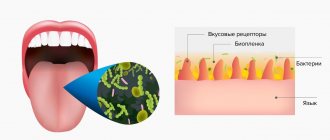April 24, 2019
Does the salty taste in your mouth and on your lips or tongue have anything to do with what you recently ate? So it’s time to read the article prepared by the editors of the UltraSmile.ru portal. Keep in mind that the problem can be caused by very unpleasant and even dangerous processes occurring in the body. Details below.
A salty taste in the mouth can be caused by many factors.
Reason #1: poor oral hygiene
If you don't clean your teeth and gums well enough or completely ignore your daily care routine, plaque will begin to accumulate on your teeth. Initially, it is soft in consistency, but under the influence of salts from saliva it mineralizes and hardens. Such plaque is an excellent “base” for the proliferation of pathogenic bacteria; it cannot be cleaned without the help of a dentist and professional hygiene procedures. Bacterial waste products and mineralized, hardened plaque contribute to the sensation of a salty taste on the lips and in the mouth.
The development of bacteria on teeth can cause saltiness
Reason #2: bleeding gums
There is a taste of salt and you don’t know what could be causing it? The cause of this phenomenon could be bleeding gums. It could arise against the background of trauma to the mucous membrane or as a result of the development of gingivitis or periodontitis.
Blood is close in its ionic composition to sea water. It contains sodium and chloride ions, due to which people with a similar pathology experience a salty taste.
Your mouth may also feel salty due to the fact that you recently had a tooth removed. After all, after this procedure, a wound has formed, which first bleeds, and then ichor is released from it for a long time. Damaged tissues need time to heal, after which the unpleasant symptom will no longer bother you.
Inflammation and bleeding of the gums causes this problem.
Allergy
An allergic reaction is accompanied by the release of a whole cascade of substances. There are several mechanisms due to which salty taste develops. It is caused by mucus and tear fluid entering the mouth during allergic rhinoconjunctivitis, a decrease in the concentration of fluid in saliva, and the ingress of substances involved in the development of an allergic reaction. This is not the most striking symptom of an allergy, and there is no need to specifically fight it - the salty taste in the mouth will go away on its own after the allergic reaction is over.
Reason No. 3: abuse of salty foods
Why are your lips salty and your mouth taste like salt? The most common reason is that you ate salty food. Remember that salt in large quantities is harmful to the body, it negatively affects the cardiovascular system, kidneys and liver, stomach, retains fluid in the tissues, and at the same time contributes to poor absorption of calcium, which is so beneficial for our teeth and bones. Salt accelerates the aging of the body and impairs the functioning of blood vessels.
As an alternative to this product, scientists advise adding healthy and safe natural substitutes to your food - celery, herbs and seasonings, garlic, dried seaweed. To preserve the salts found in natural foods, it is recommended to steam them rather than fry or boil them.
Excessive salt intake can leave a taste on the lips and tongue
A scientist from Maine actually proposed an alternative way to salt food - special cutlery that, touching the tongue, produces impulses. Thanks to this, a person has the feeling that he has eaten rich food. Scientists at the University of Tokyo have also developed a three-mode electric plug that can imitate the taste of salt. Such a fork was tested in one of the restaurants in Tokyo, where visitors were offered to eat completely lean cutlets with its help. After using such devices, the same taste of salt appears in the mouth and on the lips.
Consequences of long-term use
Among the late signs of “salt” consumption, further progression of nervous system disorders should be noted. Typical symptoms of such a drug addict are:
- intellectual impoverishment;
- lack of ability to concentrate on one thing;
- inability to concentrate;
- violation of memorization and logical thinking;
- sleep disturbance.
The drug addict becomes uncontrollable, he constantly gets irritated over trifles and shows unmotivated aggressiveness. Sometimes there is paranoia. All organs are gradually destroyed.
Important! If a person does not undergo treatment, his life expectancy does not exceed 5-6 years.
Get help now
Do any of your relatives or friends have an addiction? Have you tried in every possible way to help, but as a result the person still returned to his past life?
You are not the first to encounter this problem, and we can help you.
We guarantee anonymity, we will persuade you to undergo treatment, and we will help you choose a center.
Call us
8
or
Call me
Reason #4: Dehydration
If you have a salty taste in your mouth, then it’s time to calculate how much clean water you drink per day. Because it is the imbalance of fluid in the body that often becomes the answer to the question of why the salty taste bothers us. Our saliva contains sodium chloride, in other words, it is ordinary salt. When fluid is lost in the body, blood and saliva thicken, causing dry mouth. Saliva undergoes a process of dehydration, causing it to contain more salt and less liquid and other useful minerals. The more severe the dehydration, the more clearly the unpleasant symptom appears.
The cause of dehydration could be a low-carbohydrate diet, taking diuretics, poisoning and indigestion, drinking alcoholic beverages, drinking too much strong coffee or soda, or smoking a large number of cigarettes. Dehydration can develop during intense physical activity, after spending a long time in the scorching sun or in hot, stuffy rooms.
An imbalance of fluid in the body often causes a bothersome salty taste.
When dehydrated, the taste of salt may be accompanied by other alarming symptoms: weakness, dizziness, thirst, rare urination, diarrhea. The first thing to do in such a condition is to drink as much liquid as possible, in particular clean water. It’s better to generally make it a rule to drink at least one and a half or two liters of water a day every day. This is approximately 8 glasses. However, in cases where the body suffers from dehydration, this figure can be safely increased. For example, lovers of strong coffee drinks who drink up to 5 mugs of coffee a day should regulate the balance of healthy fluids in the body by taking 2-3 glasses of clean water more than those who are not fond of coffee.
Severe intoxication
Life-threatening poisoning from an overdose of “salt” itself manifests itself as follows:
- severe chest pain;
- a feeling of the heart “jumping out”, tachycardia and arrhythmia;
- difficulty breathing;
- pulsation of the arteries in the temples, severe headache;
- redness of the eyes;
- high temperature up to 40-42 degrees;
- severe panic, fear of death;
- auditory and tactile hallucinations.
When such symptoms appear, the only correct way out is to urgently call a doctor. Before his arrival, you can do the following:
- wipe the body with cold water;
- to reduce blood pressure, take an antihypertensive drug;
- relieve spasms and pain by taking antispasmodics (“No-shpa”, “Spazmalgon”);
- Use the liquid only if the pressure decreases; it is necessary for detoxification and to prevent dehydration;
- lay on a hard surface and turn your head to one side to prevent aspiration of vomit into the respiratory tract.
Important! Do not use strong antihypertensive drugs; a sharp decrease in blood pressure will lead to loss of consciousness. Antipyretics will not help either; a more effective method in this case is cool rubbing.
Lack of professional help in case of severe overdose of “salt” results in liver or kidney failure, rhabdomyolysis and death. There are many cases described in which a person commits suicide after taking a large amount of a stimulant.
Reason #5: taking certain medications
The feeling of salt in the mouth and lips appears when using hormonal drugs, antihistamines, antidepressants and diuretics. The problem is often typical for people who are being treated for cancer with chemotherapy. If the constant taste of salt is associated specifically with taking certain medications, then when they are discontinued, it will disappear without a trace. If the pills need to be taken on an ongoing basis, then why not visit your doctor so that he can select a different drug? This way you can get rid of the problem.
Reason #6: ENT diseases
The salty taste sometimes has rather trivial causes: for example, bacterial sinusitis, allergic rhinitis, tonsillitis, pharyngitis, sinusitis or a cold. During inflammation, mucus appears in the sinuses, which consists of mucin protein, salt, nucleic acids and water. In the acute course of the disease, snot flows down the walls of the nasopharynx into the throat, and accordingly, a feeling of salt occurs. With sluggish inflammation of the ENT organs, mucus is also constantly disturbing by its appearance in the mouth.
ENT diseases also contribute to the appearance of a salty taste
Infections
Caries, gingivitis - each such infection without proper treatment can progress and lead to serious complications and consequences that affect many organs and systems.
With serious gum diseases such as periodontitis, patients are concerned about the following symptoms:
- tooth mobility;
- the formation of pathological gum pockets and purulent discharge from them;
- pain, burning and other unpleasant sensations in the gums;
- persistent bad breath;
- formation of massive dental plaque.
A fungal infection, which is characterized by the appearance of a white cheesy coating on the mucous membrane, can also provoke a salty taste in the mouth. With moderate and severe infection, patients may complain of a change in the taste of their usual food and the appearance of off-flavors.
HPV, the human papillomavirus, can infect the mouth and cause a strange taste in the mouth. If the diagnosis was not carried out on time and there is no treatment, this can cause a metallic and salty taste in the mouth.
Reason #7: dysfunction of the salivary glands
A specific taste of salt appears in the mouth as a result of the development of various diseases that damage the functionality of the salivary glands:
- Sjögren's syndrome: is an autoimmune systemic disorder of connective tissue. The disease mainly affects the lacrimal and salivary glands. The pathology can develop against the background of rheumatoid arthritis or lupus erythematosus,
- xerostomia: a condition characterized by dry mouth, which explains the presence of a salty taste in the mouth. This pathology can develop in those who take antihistamines or antidepressants, suffer from hypertension and diabetes. The disease also occurs in people who have undergone radiation therapy in the head and neck area. However, according to some studies, xerostomia most often occurs in older people. Between 10 and 60% of older people worldwide suffer from dry mouth. Moreover, the disease most often affects women1.
The culprit may be salivary stone disease, which is caused by blockage of the salivary glands. You can read about it in more detail in a separate article on the website, specially prepared by journalists from the portal’s editorial office.
Dry mouth causes a specific taste
The salty taste that occurs against the background of xerostomia is not dangerous in itself. But the diseases that caused it are dangerous, as well as the unpleasant consequences of dry mucous membranes. The fact is that saliva is a protector of the oral cavity from bacterial attack. Saliva also washes away food particles and helps us soften food. But if there is not enough of it, then difficulties with swallowing food and stomach problems inevitably arise, as well as dental problems. A person with xerostomia has a high risk of rapid development of oral dysbiosis, caries, pulpitis, periodontitis, gingivitis, and stomatitis. Also, when the mucous membrane is dry, a persistent bad breath occurs.
Hormones are acting up
Hormonal problems, particularly diabetes, can also lead to dry mouth. Sometimes it may additionally be a taste of acetone, since diabetes mellitus is often accompanied by damage to the kidneys and central nervous system.
Brain pathologies This is the rarest cause of the symptom. Receptors on the tongue respond to the chemical composition of food, but the concept of taste is formed in the cerebral cortex. This means that with normally functioning receptors and nerves, a healthy oral cavity and neighboring organs, the functioning of the part of the cortex responsible for the perception of taste may be disrupted. Such disorders can be observed in brain tumors, epilepsy, and a number of mental illnesses. If the patient does not have such a diagnosis or a history of head injuries, the doctor is unlikely to immediately think about such a cause of the salty taste - it is very unlikely.
Why does the problem occur in women?
Taste of salt in my mouth. What does it mean? Most often, the phenomenon occurs in women, for example, before menstruation or during pregnancy. Saltiness in the mouth may be due to dehydration as a result of toxicosis. Another reason is dysgeusia. This is a disease in which taste disturbance occurs. During pregnancy, under the influence of hormones, such a condition occurs often and is temporary - after delivery everything goes away without a trace.
Pregnancy often causes toxicosis
The fair half of humanity may have salt on their lips and mouth due to frequent mood swings and emotionality. The reason for its appearance is tears. However, tears can become a frequent companion not only for women, but also for everyone else if there are more serious health problems: allergies, eye diseases, photophobia.
In older women, the taste of salt on the lips and mouth occurs due to menopause. The phenomenon is often accompanied by dry mucous membranes, the inability to swallow hard or large pieces of food, itching and burning.
Psychical deviations
Mental disorders are also typical signs that an addict is using “salt.” Soon after the substance enters the body, the following is noted:
- severe anxiety and persecution mania;
- speech defects;
- spastic muscle contractions, expressed in involuntary movements of the lower jaw;
- hallucinations (mostly auditory, but sometimes visual);
- animated gestures, chaotic movement of limbs and head);
- sleep disturbance;
- strong foul odor from sweat and sebaceous glands;
- the appearance of delusions and delusions of grandeur.
Why does the problem occur in men?
There is a salty taste in my mouth. What is it and why does it occur in men? This phenomenon often occurs in athletes or people engaged in exhausting physical labor. During physical overload or training, blood pressure rises and blood flows stronger. And as we have already found out, the blood contains sodium, chloride and iron ions. This explains why, after physical labor or active sports, a person has salty lips and a feeling of salt in the mouth.
Don't abuse alcohol
In the morning after a stormy party or get-togethers with friends, you wonder why there is a taste of salt in your mouth? The reason may lie in alcohol abuse. Don't forget that alcoholic drinks have a strong dehydrating effect. An excess of alcohol in the blood causes intoxication and dehydration of the body. To restore the balance of fluids and beneficial minerals in the body, be sure to drink plenty of distilled water and mineral water in the following days.
Mild form of poisoning
Conventionally, there is a distinction between mild and severe forms of “salt” overdose. A mild form of intoxication manifests itself as follows:
- chills occur;
- the heart rate increases significantly;
- there is discomfort in the chest;
- dizzy and headache;
- nausea and vomiting appear;
- insomnia.
When measuring blood pressure, the numbers turn out to be high, and mild hyperthermia is sometimes observed. Help with a slight excess of the dose can be provided at home. It consists of the following actions:
- drink plenty of fluids to speed up the excretion of the substance by the kidneys;
- take Corvalol to reduce heart rate and blood pressure.
Important! Caffeinated liquids that stimulate the nervous system should not be used as drinks. This will make the condition worse. It is best to take a horizontal position and try to calm down.
What can you say about children?
If a child feels the taste of salt in his mouth and lips, then the reasons can be completely different. This may be due to poor oral hygiene, dehydration, or internal diseases of the body. Here, to identify the problem, you need to observe the baby. If the phenomenon is permanent, then it is necessary to contact a pediatrician and show the child to a dentist. Doctors will examine the little patient, conduct a series of studies, and issue a referral for tests. If you have a constant taste of salt in your mouth, adults should also be examined by a therapist and dentist.
Notice
: Undefined variable: post_id in
/home/c/ch75405/public_html/wp-content/themes/UltraSmile/single-item.php
on line
45 Notice
: Undefined variable: full in
/home/c/ch75405/public_html/wp-content /themes/UltraSmile/single-item.php
on line
46
Rate this article:
( 25 ratings, average: 4.52 out of 5)
prevention
- I.M. Makeeva, V.Yu. Doroshina, M.G. Arakelyan. Xerostomia and remedies that alleviate its manifestations. Dentistry. 2013;92(5): 12-13
How to survive withdrawal
To eliminate withdrawal symptoms, it is best to contact specialists at the clinic and undergo full treatment. They will help:
- slowly reduce the pressure until completely stabilized;
- restore the functioning of the nervous system and mental functions;
- relieve pain and spasms;
- reduce body temperature to normal levels;
- eliminate the urge to vomit, diarrhea.
In the first few weeks, or even months, a person needs complete rest. During this time, he should sleep and eat as much as possible to return to normal. After which, rehabilitation will be required to prevent a breakdown.
Comments
Which doctor should you visit first if you constantly have a salty taste in your mouth?
Agata (05/16/2019 at 07:44 pm) Reply to comment
- Dear Agatha! First you need to visit a dentist and an ENT doctor. You need to take a biochemical blood test and take pictures of the paranasal sinuses. If these doctors have not identified any problems, then be sure to go to a therapist, who will prescribe tests for other diseases.
Editorial staff of the portal UltraSmile.ru (05/20/2019 at 09:18) Reply to comment
Have you found the reason for the taste of salt in my mouth? I’ve been going to all the doctors for 2 months, no one knows
Julia (05.05.2021 at 18:05) Reply to comment
Did you happen to take the drug remantodine?
Ruslan (11/20/2021 at 01:30) Reply to comment










